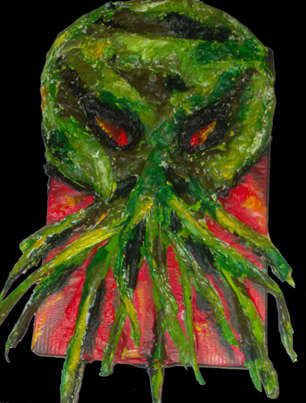God created the Heavens and the Earth. “And God saw everything that he had made, and behold, it was very good” (Gen 1:31). Then an alliance between human beings and the devil brought sin into the world and all our woe. Then sinners, to excuse themselves, see everything that God had made and behold, it is very bad.
Augustine said that evil is an “absence of being,” that is, a lack of something God created good. Death is the absence of life, and murder attempts to negate someone else’s God-given life. Sexual sins reflect the absence of life-giving sexuality according to God’s design. False witness, stealing, coveting, cruelty, hatred, and other sins against our neighbor exhibit the absence of love. In this view, sin amounts to a rebellion against reality.
What provoked these thoughts is a post by John Ehrett, former student and fellow Patheos blogger, entitled Lovecraft and the Metacrisis of Liberalism. It is a masterful example of how literary criticism can illuminate a worldview issue and give us insight into our times.
The post is about the horror writer H. P. Lovecraft (1890-1937), whose writings are enjoying a comeback, along with the horror genre generally. Lovecraft developed the Cthulhu Mythos, in which human beings inadvertently awaken the underlying deities of the universe, who are utterly malign. I’ll let Ehrett explain it:
Lovecraftian “cosmic horror” is built around the premise that the cosmos is utterly indifferent to human beings. But that’s not to say the cosmos is empty. Rather, the most powerful forces in reality are ancient, godlike beings of chaos—the Great Old Ones—whose intentions are inscrutable and who care nothing for humanity. These Great Old Ones cannot be comprehended within the frame of normal human experience: even momentary exposure to the Great Old Ones’ presence is enough to reduce a human consciousness to gibbering madness.
This, of course, is very different from horror stories influenced, if only implicitly, by Christianity.
Lovecraft’s tales of cosmic horror reflect a metaphysical picture wholly alien to Christianity. Other stories like Dracula, The Exorcist, or even Event Horizon emerge from a distinctly Christian milieu. The forces of evil in those stories are understood to be evil by virtue of what they oppose: Dracula sets himself up over against God, a demon seeks to claim the soul of an innocent girl, and an ancient power of evil defiles the image of God in man. That is to say, there is a distinct moral duality at work in these tales and others like them—one that allows the descriptor “good versus evil” to be properly applied to them. The heroes are on God’s side, and the villains are on the devil’s.
But that is not how Lovecraft’s tales proceed. “Evil” is an unintelligible concept in Lovecraft’s literary world, because there is no transcendent ideal against which “evil” might define itself. There is no good or evil, only comprehensible or incomprehensible power. Indeed, the very essence of the Great Old Ones is near-absolute coercive authority that feels no need to justify or legitimate itself. They will do what they will do, and be what they will be, regardless of what human beings might think. There is nothing democratic or deliberative about these power relations; Lovecraft’s cosmos is ruthlessly, relentlessly hierarchical—and the human species is at the bottom of the ladder. The primary objective of any human character in a Lovecraft story is simple: escape!
I remember watching a modern Dracula movie that purported to be more faithful to Bram Stoker’s original 1897 story (1897) than the iconic black-and-white 1931 film starring Bela Lugosi. But it wasn’t. In the Lugosi film, as in Stoker’s novel and as in vampire folklore, Dracula is vulnerable to sacred symbols and cannot remain in the presence of a crucifix. But in the modern version, Dracula attacks a man who, cowering, holds up a crucifix. The vampire swats it away to general laughter.
Consider today’s hit movie Joker, which portrays the comic book villain in terms of the isolated involuntary celibates associated with today’s school shooters and mass murderers. His world is “utterly indifferent” to him, wholly bleak and ugly and evil, which eventually transforms its victim into someone who himself becomes “utterly different” to other human beings, wholly bleak and ugly and evil, his “human consciousness” reduced to “gibbering madness.” In this Joker, there is no Batman.
Ehrett relates this nihilistic worldview to the “postliberal” mindset that we have discussed.
The increasing popularity of Lovecraftian horror, I think, tracks (at least in part) a broader cultural shift away from the good/evil conceptual duality. In Lovecraft’s pitiless world, the traditional “good/evil” dyad is replaced by the dyad “freedom/oppression”—as it has in much contemporary discourse.
Leftists think all authority is a Cthulhu-like imposition of oppressive power. The only hope is for the oppressed to assert their freedom by resisting the power structure and its imposed values until they can seize a similar power for themselves. But conservatives, while being very different, sometimes think in terms of the same dichotomy, with government, by its nature, exercising oppressive power, with individuals needing to assert their freedom against it.
We have lost the basis of legitimate authority and legitimate power, the sort that is “very good.” Vocation teaches that God, in His providential love, works through human beings–in their ordinary callings in the family, the workplace, the church, and the state–to care for His creation. We not only lack that understanding, we have a lack of people carrying out their callings in love and service to their neighbors, preferring instead to use them for their own Cthulhu-like self aggrandizement.
In the absence of God and His righteousness, people assuming that “the real world” is intrinsically evil. When people do talk of God, they often project Him as being intrinsically evil too! This is evident in the new atheist’s moral arguments against God’s existence. And sometimes even believers in God present him as an arbitrary, indifferent, amoral power not much different than Cthulhu! Ehrett notes that we sometimes hear this view of God from extreme Calvinists–of the sort Lovecraft grew up with–though the Reformed folks that I know do not go nearly that far but always insist on God’s radical and inherent goodness.
Still, I appreciate Ehrett’s Lutheranism:
As a Christian, I would argue that the legitimation of power (in the very deepest sense) begins with the fundamental ontological hierarchy inscribed into the very fabric of creation: the infinite God calls into being the order of finite things. This foundational hierarchy can never be transcended, try though we might. But the Lutheran tradition goes a step further: God’s power is revealed in the death of Jesus on the cross and His subsequent resurrection—not through explosive demonstrations of sovereign will that shatter human categories. And in the cross, the categories of power relations are accordingly subverted: the truest and best leader is the one who voluntarily dies for his people. Power, in short, manifests as love.
Without God all you have is the devil. The Biblical worldview recognizes the darkness inherent in a sinful world. Those who feel trapped in that world–the depressed, the hurting, the unfortunate–are not abandoned in their suffering. God Himself entered that dark and sinful world, bearing it all in the cross, bringing redemption. And then He rose from the dead. He now calls us to join Him in the battle against the Cthulhu in the world and in ourselves.
Illustration: “Cthulhu,” by Reiner Zaminski [Public domain] via Wikimedia Commons














